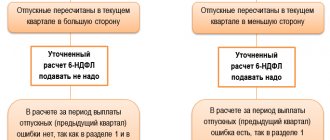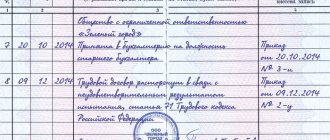Planning the use of annual leave
The Labor Code of the Russian Federation (Article 123) requires the employer to plan vacations for its employees for each coming year, reflecting the time of their provision in the vacation schedule, approved no later than 2 weeks before the start of the next year. In accordance with this schedule, employees must go on vacation, and the employer must not only let them go there, but even before it starts no later than:
- give 2 weeks notice of your planned vacation against receipt;
- 3 calendar days to pay vacation pay (Article 136 of the Labor Code of the Russian Federation, information from the Ministry of Labor of Russia dated June 16, 2014).
Does this mean that no deviations from the vacation schedule are possible and that the transfer of annual leave at the initiative of the employee is unacceptable? No, it doesn't mean that. Despite the fact that the schedule is a binding document, deviations from it are not only possible, but in some cases they turn out to be necessary.
All reasons for postponing vacation can be divided into 3 groups:
- The employer is obliged to extend or postpone leave by agreeing on the specific type of action and timing with the employee.
- The employee makes a request for a transfer. The employer here may have both an obligation to agree with this and the right to give or not give his consent to the transfer of leave at the request of the employee.
- The initiative for the transfer comes from the employer, and in order for it to take place, the employee must give his consent.
The justification for the latter situation is production necessity. Moreover, it is even possible to postpone the time of the next vacation to the next year, if the employee is not one of those for whom failure to provide vacation annually is prohibited (Article 124 of the Labor Code of the Russian Federation). These are the faces:
- under the age of 18;
- working in harmful or dangerous conditions.
It should be borne in mind that additional vacations available to “harmful workers” and some other persons, in terms of transfer, will be subject to the same rules as regular vacations.
ConsultantPlus experts told us what documents to use to formalize the transfer of vacation for any reason. Get free trial access to the system and move on to the Ready-made solution.
If the sick leave falls on vacation
Annual paid leave must be extended if the employee falls ill while on leave.
Vacation can either be extended by the number of days of sick leave, or postponed.
If an employee wants to postpone his vacation to another time, he needs to write a statement and submit it along with the sick leave to the company. The head of the company must decide to make changes to the vacation schedule.
How to reschedule vacation if an employee gets sick while on vacation and takes sick leave, the FSS of Russia explained in a letter dated November 30, 2020 No. 02-09-14/15-03-31170.
If, after being sick on vacation, an employee returns to work as scheduled, unused vacation days are transferred to another time agreed with the employer.
The situation is different if the sick leave is issued in connection with the illness of a child, and not the employee himself. In this case, you should not count on the transfer or extension of annual paid leave (letter of the Ministry of Labor of Russia dated October 26, 2022 No. 14-2/OOG-8536).
More details on the topic:
Transferring vacation due to sick leave
How sick leave affects the duration of vacation and the calculation of vacation pay
Sick leave on vacation at your own expense: pay or not?
Grounds for the obligation to extend or reschedule vacation
The employer is obligated to extend or postpone vacation in cases where the vacation period coincides:
- with sick leave (but only the employee himself, and not his family members);
- the period of performance by the employee of state duties requiring release from work;
- other situation provided for by law (including local regulations).
By agreement with the employee, the vacation is either extended by the number of days unused by him for the above reason (the reason must be documented, but no other papers will be required), or transferred to other days (in this case, an application from the employee is required indicating the specific period).
Another obligatory basis for the employer for postponing vacation at the initiative of the employee is the violation of one of the deadlines that is important for the vacation (warning the employee about its start or payment of vacation pay). In such a situation, an employee is given the right to demand the transfer of rest time to another period (Article 124 of the Labor Code of the Russian Federation).
On what grounds can a transfer be made under the Labor Code of the Russian Federation at the request of an employee?
If the transfer of leave is carried out at the initiative of the employee, then the reasons may be the following:
- sick leave while on vacation - sample application for transfer;
- going to work during the vacation period to perform government duties;
- personal desire of the employee due to family circumstances.
The first two reasons are enshrined in Article 124 of the Labor Code of the Russian Federation. If an employee declares a desire to reschedule rest time due to incapacity for work or performance of government duties, then the employer cannot refuse.
The timing of the transfer is agreed upon bilaterally.
If an employee wishes to postpone the vacation dates established in the schedule before going on vacation, this must be stated in writing, indicating the reason.
If the employer considers a transfer possible, the procedure will be carried out.
Postponement of the next annual holiday for family reasons
The reason called “family circumstances” is not enshrined in the Labor Code of the Russian Federation as a valid reason for postponing vacation.
The employee has the right to ask for a transfer, but the employer himself decides whether to grant the request or refuse.
The employee must express his desire to change vacation dates in writing using an application. The text should explain the reasons for the transfer. You need to try to ensure that the stated reasons are really important and respectful, this will increase the chances of the transfer being approved by the manager.
If agreed, the employer issues a transfer order.
The employer evaluates the validity of the reason. The application can include the general wording “family circumstances,” but this may not be enough to get management to agree. It is advisable to describe the reasons in more detail and, if possible, document them.
Typically, valid reasons include the following family circumstances:
- undergoing treatment (confirmation may be a referral from a medical institution or a trip to a sanatorium or dispensary);
- the need to care for a sick family member - parent, child, spouse (in this case, you can issue a sick leave);
- preparing to enter an educational institution or passing exams in it, while the employee may request a study leave so that the educational leave does not coincide with the annual one, the employee may ask for a transfer;
- the birth of a child in the family;
- your own or a relative’s wedding;
- death of a relative;
- provision of leave at a second place of work (in this case, the part-time employer is obliged to provide annual leave at the same time as the main employer);
- an important family celebration - for example, an anniversary of parents who live at a distance when the trip takes a long time;
- the need to move to a new place of residence, this procedure may also require a long period of rest.
All of the above reasons are just examples of how you can explain the need to postpone your vacation. The employer decides for himself whether they are respectful or not. The right to refuse without breaking the law.
If the employer refuses to transfer it, then it is possible to arrange several days off at your own expense.
For example, 5 unpaid days of rest can be requested for the birth of a child, a personal wedding, or the death of a relative.
It is also recommended to look into the local acts of the organization and the collective agreement, which the employee must be familiar with when applying for a job. Perhaps they contain additional valid reasons that may serve as a basis for the mandatory transfer of vacation, in addition to those specified in Article 124 of the Labor Code of the Russian Federation.
How to properly register according to the Labor Code?
The procedure for registering the transfer of regular annual leave at the request of the employee includes the following steps:
- Stage 1. The employee writes a statement requesting a transfer and indicating the reason.
- Stage 2. Submitting an application to the employer.
- Stage 3. The manager makes a decision and puts a resolution on the application.
- Stage 4. Drawing up a transfer order if the request is approved.
- Stage 5. Making changes to the schedule based on the order.
An employee can be sure that his annual leave has been postponed only if an order has been drawn up to transfer and amend the schedule.
The employer is obliged to familiarize the employee with the changes against signature.
When can an employer refuse?
The manager may refuse to allow an employee to postpone the next vacation in cases that are not stipulated in the Labor Code of the Russian Federation.
He cannot refuse on the following grounds:
- incapacity for work on vacation;
- fulfilling government duties while on vacation;
- provision of leave at the place of main work (the part-time employer, at the request of the employee, is also obliged to provide rest at this time);
- upon occurrence of the reasons specified in the employer’s local regulations.
All other reasons, the general name of which is “family circumstances,” are not a valid reason for postponing vacation dates to another date.
Reasons for shifting leave at the employee’s initiative
Other reasons for postponing vacation at the employee’s initiative can be very different, and here the employer will be the coordinating party. However, there are situations where the employer does not have the right to refuse. At a time convenient for him, leave will be granted to the employee:
- who has adopted a child under 3 months of age (Article 122 of the Labor Code of the Russian Federation);
- the husband of a woman on maternity leave (Article 123 of the Labor Code of the Russian Federation);
- a woman who wants to add her next leave to maternity leave or child care leave (Article 260 of the Labor Code of the Russian Federation);
- parent (including adopted), guardian or trustee of a disabled child under the age of 18 (Article 262.1 of the Labor Code of the Russian Federation);
- under the age of 18 (Article 267 of the Labor Code of the Russian Federation);
- a part-time worker taking leave at the place of his main job (Article 286 of the Labor Code of the Russian Federation);
- the victim of the accident at the Chernobyl nuclear power plant or those who participated in the liquidation of its consequences (clause 5 of article 14, article 15 of the law “On Social Protection...” dated May 15, 1991 No. 1244-1);
- who received a dose of radiation during nuclear testing at the test site in Semipalatinsk (clause 15 of Article 2 of the Law “On Social Guarantees...” dated January 10, 2002 No. 2-FZ);
- marked with the “Honorary Donor” sign (subclause 1, clause 1, article 23 of the law “On donation...” dated July 20, 2012 No. 125-FZ);
- a disabled person, a war participant, a combat veteran or on duty in the territory of their jurisdiction, who underwent military training or worked for the defense of the country during the Second World War, who lived in besieged Leningrad (subparagraph 17, paragraph 1, article 14, subparagraph 15, paragraph 1 article 15, subparagraph 13 paragraph 1, subparagraph 4 paragraph 2, subparagraph 3 paragraph 3 article 16, paragraph 9 article 17, paragraph 9 article 18, paragraph 10 article 19 of the law “On Veterans” dated January 12, 1995 No. 5-FZ);
- the spouse of a military serviceman receiving leave at his place of duty (Clause 11, Article 11 of the Law “On the Status of Military Personnel” dated May 27, 1998 No. 76-FZ);
- a police officer who did not have the opportunity to exercise his right to leave in accordance with the approved schedule (clause 3 of article 57, clause 2 of article 64 of the law “On service in internal affairs bodies ..." dated November 30, 2011 No. 342-FZ);
- Heroes of Labor, Socialist Labor, full holder of the Order of Labor Glory (clause 2 of article 6 of the law “On the provision of social guarantees...” dated 01/09/1997 No. 5-FZ);
- Heroes of the USSR, Russian Federation, full holder of the Order of Glory (clause 3 of article 8 of the law “On the status of Heroes...” dated January 15, 1993 No. 4301-1).
In all other cases, the employer has the right to either agree to postpone the vacation at the request of the employee or refuse it. If the employer has no fundamental objections to the transfer, but disagrees with its terms, the parties must agree, setting terms that suit both parties (both the employer and the employee).
What is the deadline to transfer personal income tax in case of payment of compensation for vacation exceeding 28 days, or in case of a lump sum payment for vacation, explained 2nd class adviser to the state civil service of the Russian Federation D. A. Morozov. Get free trial access to the ConsultantPlus system and find out the official’s answers to these and other questions.
Transferring vacation to next year
Annual paid leave cannot be replaced either by a compensation payment, except in cases of dismissal of employees, or by transferring the rest period to the next year. However, like any rule, this norm has exceptions.
Vacation appointments are regulated in accordance with Art. 122 of the Labor Code of the Russian Federation, which establishes that an employee is entitled to 28 calendar days of vacation for each working year. An important provision indicates that it is not the calendar year that is taken into account, but the working year, which is calculated from the date the employee begins working. The working year is 12 calendar months from the date of registration of labor relations, after which the employee is entitled to annual paid leave. At the same time, it is clarified that leave can be granted at any time of the working year, regardless of the “convenience” or “wishes” of the employee of the enterprise.
If, due to some serious circumstances, the employee was unable to take advantage of the opportunity to rest for the past working year, due to his retraining or reorganization of the enterprise, etc., then the vacation can be postponed to any time over the next 12 months, as well as combined with the vacation of the next working year in full or in part.
It is impossible to replace a vacation not taken with compensation, so you can only take it off. It is allowed to go on vacation several times a year if the employee thus uses all rest days in full. Payment of compensation is allowed only for that part of the vacation that exceeds the 28 calendar days established by law.
Registration of transfer (employee application and employer order)
How to arrange the transfer of vacation at the request of an employee? First of all, the employee must express his wish for the transfer by submitting a statement to the employer about this. Such a statement does not have a set form, but it is obvious that it must contain:
- details of the applicant (full name, position, name of the unit that is the place of work, personnel number);
- a statement of the essence of the issue (i.e., a request for a postponement, indicating the reason for this and the timing by which the start of the vacation should be shifted);
- date of compilation and signature of the submitter.
For information on how an application for transfer can be completed, read the article “Application for transfer of leave - form and sample.”
When deciding to satisfy the request of the applicant, the employer issues an order to postpone the vacation at the request of the employee. The main part of this document will duplicate the content of the employee’s statement, presenting his request in an affirmative manner.
A sample order for transferring vacation can be downloaded from the link below.
The order will become the basis for making changes to the vacation schedule and the employee’s personal card.
Find out how to reschedule your vacation in the vacation schedule here.
If an employer wants to reschedule an employee's vacation
If an employee’s vacation in the current working year may adversely affect the normal course of work of the organization, with the consent of the employee, the vacation can be postponed to another time. However, it must be used no later than 12 months after the end of the working year in which it was due.
The basis for postponing vacation is the order of the manager. The employee must be informed in writing of such a decision and obtain his consent to the transfer. This follows from articles 123 and 124 of the Labor Code.
After transferring the vacation, you need to make changes to the vacation schedule, make entries in columns 8 and 9 of form No. T-7.
Results
No later than 2 weeks before the start of the next year, each employer approves a vacation schedule, which both parties to the employment contract must adhere to. However, the schedule is subject to change. Amendments are made on the basis of an order drawn up by the employer.
The transfer may be either mandatory for the employer (in situations provided for by law) or dependent on his decision.
The specific dates of the transfer in the first case depend only on the wishes of the employee, and in the second they are the result of reaching an agreement between the employer and the employee. To express their wishes regarding the transfer, the employee needs to write a statement. You can find more complete information on the topic in ConsultantPlus. Free trial access to the system for 2 days.
Transferring vacation to next vacation
The law prohibits transferring vacation to the next vacation, if the next vacation is not part of the next paid vacation, divided into two parts.
In such circumstances, it is possible to postpone vacation, but only if both the employee and the employer agree to such changes, and this will not cause any difficulties or problems for the organization as a whole.
If circumstances arise that require a change in the start time of vacation, an increase in the duration of vacation is allowed if the employer and employee jointly determined such a decision as the most beneficial solution for both parties.
Also, vacation is transferred to another vacation or time if the employer has not fulfilled the conditions for sending employees on vacation, which include:
- Notifying employees at least two weeks before the start date of the vacation.
- Payment of vacation pay no later than three days before the start date of the vacation.
If any of the conditions are not met, the employee cannot be sent on vacation.
How to transfer a vacation
The transfer of leave is formalized upon submission of a corresponding application from the employee or upon issuance of an order of the same name, when the date of leave changes at the will of the employer. In this case, only the employer bears responsibility for the unlawful use of the opportunity to transfer vacation without the will of the employees.
Employees of the organization have the right to receive the following types of leave:
- Annual basic and additional, which are provided due to the employee completing one working year at the enterprise.
- Study leave, which is most often granted to student workers for a session or exams.
- Maternity leave, which is leave for medical reasons, which includes periods of rest for the employee in the period before and after childbirth.
- Child care leave granted until the child turns three years old. The legislator specifies that the employee can leave it at any time convenient for himself, as well as extend his vacation for a short period.
It is impossible to replace vacation or transfer it to certain categories of employees, as this is prohibited by mandatory legislation.
Such employees include the following categories of citizens:
- workers who are employed in hazardous and hazardous industries;
- workers who have not reached the age of majority.
The employer will not be able to change the vacations of such employees even if they apply and request, since this norm of labor law is mandatory and is subject to full execution in accordance with the law.
When it is prohibited to reschedule vacation
Annual paid leave must be extended or postponed to another period determined by the employer taking into account the wishes of the employee upon the occurrence of temporary disability of the employee himself (Article 124 of the Labor Code of the Russian Federation).
But if during the next vacation the employee took sick leave to care for a child, the employer is not obliged to extend or postpone the employee’s vacation for the period of incapacity.
Moreover, a certificate of incapacity for work for caregiving is not issued during the period of annual paid leave and leave without pay (clause 40 of the Procedure for issuing certificates of incapacity for work, approved by order of the Ministry of Health and Social Development of Russia dated June 29, 2011 No. 624n). That is, sick leave for child care should not be issued during the regular vacation; it is not paid and does not affect the total duration of the employee’s vacation.
And if an employee nevertheless takes sick leave during vacation and does not go to work on time, then he risks being fired for absenteeism.







